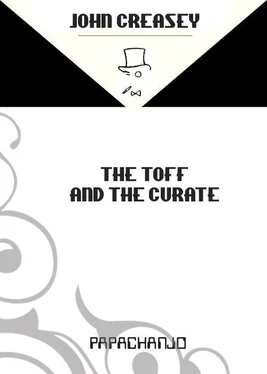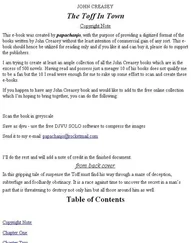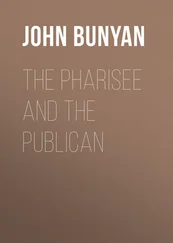John Creasey - The Toff And The Curate
Здесь есть возможность читать онлайн «John Creasey - The Toff And The Curate» весь текст электронной книги совершенно бесплатно (целиком полную версию без сокращений). В некоторых случаях можно слушать аудио, скачать через торрент в формате fb2 и присутствует краткое содержание. Жанр: Старинная литература, на русском языке. Описание произведения, (предисловие) а так же отзывы посетителей доступны на портале библиотеки ЛибКат.
- Название:The Toff And The Curate
- Автор:
- Жанр:
- Год:неизвестен
- ISBN:нет данных
- Рейтинг книги:5 / 5. Голосов: 1
-
Избранное:Добавить в избранное
- Отзывы:
-
Ваша оценка:
- 100
- 1
- 2
- 3
- 4
- 5
The Toff And The Curate: краткое содержание, описание и аннотация
Предлагаем к чтению аннотацию, описание, краткое содержание или предисловие (зависит от того, что написал сам автор книги «The Toff And The Curate»). Если вы не нашли необходимую информацию о книге — напишите в комментариях, мы постараемся отыскать её.
The Toff And The Curate — читать онлайн бесплатно полную книгу (весь текст) целиком
Ниже представлен текст книги, разбитый по страницам. Система сохранения места последней прочитанной страницы, позволяет с удобством читать онлайн бесплатно книгу «The Toff And The Curate», без необходимости каждый раз заново искать на чём Вы остановились. Поставьте закладку, и сможете в любой момент перейти на страницу, на которой закончили чтение.
Интервал:
Закладка:
Jolly stopped.
“And the description fitted?” asked Rollison.
“I’m afraid it did, sir,” said Jolly. “Naturally it set up a train of thought, so I made other inquiries. I learned that Mr Kemp held a curacy at one of the Mayfair churches, before he went to St Guy’s.” When Rollison still did not speak, he went on almost appealingly: i did say that our sentiments had blinded us to the possibility, didn’t I, sir? In spite of what I learned, I was—I am! —reluctant to think that the circumstances are anything more than coincidental. Aren’t you, sir?”
Rollison did not answer.
CHAPTER SEVENTEEN
Help From A Lady
After some minutes of silence Jolly, looking deeply concerned, as if moved by the expression on Rollison’s face, moved restlessly and asked:
Are you feeling all right, sir?”
Rollison bestirred himself, lit a cigarette and said:
“Yes. Make that coffee, will you?”
He sat back in an easy chair, smoking, his eyes narrowed towards the ceiling. He did not stir until Jolly came in, placed the tray on a small table and turned to go.
“Bring a cup for yourself,” said Rollison.
“Thank you, sir.” Jolly returned with cup and saucer and Rollison watched while he poured out. On such occasions, it was not Jolly’s habit to sit on the edge of the chair—if Rollison suggested a drink together then Jolly rightly assumed that he did not want to stand oil ceremony. When Jolly was sitting back and stirring his coffee, Rollison appeared to relax.
“You’re quite right,” he said, with a fainl smile. “Kemp is the obvious suspect Number One—a shattering realisation. I should have remembered that Isobel Crayne told me that she had heard him preach in Mayfair. Bui unless I am badly mistaken, he is developing a fondness for Miss Crayne. Both of them stood in the way of the crane-load last night and both appeared to be in equal danger. On the other hand, if he were expecting it he would have known which way to jump. A quick eye and a quick hand—he could have dodged to one side with her at the last moment and thus lent the utmost credence to the apparent fact that he was nearly a victim. I would probably have been killed and saved a lot of trouble. Even if I escaped, I would be disinclined to suspect Kemp whatever the indications. The accident might even have been planned without any thought that I might be present, solely to make the police and me look anywhere but at Kemp.”
“It is so, sir,” said Jolly. “But—”
“If that’s the truth, he had me on a piece of string,” Rollison interrupted. “He waited until the last moment to give me a chance of pushing them aside. An unsung hero! The truth is, he appeared to have no more warning than I. I don’t remember vividly but he gave inc the impression of being petrified as he saw I lie thing coming towards him. Good acting, perhaps.”
“We mustn’t take it for granted that he is involved,” began Jolly, only to be interrupted again.
“We aren’t taking anything for granted.” Rollison drank half of his coffee and put the cup down. “I’m worried, Jolly—apart from the shattering possibility that Kemp’s involved and the consequent possibility that I have been completely taken in, it’s a very ugly situation.”
“In what way, sir?”
“If you’ve discovered that Kemp was once a frequenter of night clubs, don’t you think the police know all about it? They must have. And they’ve been very clever,” he added ruefully, “Grice was even more crafty than Chumley.” When Jolly looked mystified, Rollison went on: “Chumley has persistently refused to admit that I was interested primarily in Kemp. Grice emphasised the point but both of them have lured me into being more than ordinarily emphatic— "Kemp," said I, "only Kemp! Nothing but Kemp!" If Grice thinks as you do and remembers hearing that from me, isn’t he going to assume that I really started from Kemp in the West End and am trying to pull the wool over his eyes?”
“I suppose he is,” admitted Jolly, reluctantly.
“Of course he is! So, if Kemp knows nothing of it he’s being shot at from both sides—by
“Gregson-Keller as well as by the police. Of the two, the police are more dangerous because Kemp would have the devil of a job to live down even a temporary detention. Remember how one affected Craik! Whereas, if Kemp does know—” he broke off, standing up abruptly. “I can’t believe that he does!”
“I can hardly bring myself to believe it,” murmured Jolly. “But the evidence—”
“Yes, I know. And how clever it would be!” Rollison went to the telephone and dialled a number. “Hallo,” he said at last, “is Miss Isobel Crayne in, please? . . . Yes, I’ll hold on.” In a few moments, however, he was disappointed for Isobel was spending the night with friends in Caterham. After some trouble he got the number of the friends but, when he put a call through, he was told that there must be some mistake, Isobel had not been there.
“Curious,” commented Rollison, thoughtfully.
“What did you propose to do, sir?” asked Jolly.
“Get help from Miss Crayne,” said Rollison, cryptically.
“Do you propose to do anything about the man Owen?” Jolly appeared disinterested in Isobel’s non-appearance at Caterham.
“I think we’ll murmur a word into the ears of the police about Owen,” Rollison said. “There’s no reason why we should not be co-operative.”
Grice was not at the Yard but an alert sergeant took his message and promised to see that Owen’s record was investigated. Satisfied and apparently in a better humour, Rollison went to bed.
He woke just after seven and was in his bath before Jolly made tea. At nine o’clock he telephoned Isobel again, to be told that she was not expected home until eleven o’clock. At nine fifteen, as he was about to leave the flat, Grice telephoned and wanted to know more about Owen.
“I can’t tell you any more,” said Rollison, “except that I told him I thought Cobbett might have been paid to make that mistake with the crane. Since Cobbett was murdered, Owen becomes an obvious suspect. The moment I realised that, I telephoned you.”
“The very first moment?” asked Grice, sceptically.
“Yes,” said Rollison, “I’m getting trustful, aren’t I? Have you learned anything during the night?”
“No, there’ve been no developments here,” said Grice.
Rollison rang off and went out. He called on an old friend, the vicar of a Mayfair church, and asked him what he knew of Ronald Kemp. He did not expect to see a frown cross the parson’s good-natured face.
“What has he been doing?” asked the parson.
“Trying to put the East End to rights in a hurry,” said Rollison. “Did you hear about his fight?”
“What fight?” The vicar was amused when Rollison told him but quickly frowned again. “It isn’t out of character with Kemp, Rolly, and yet—well, I hesitate to talk too freely. I suppose I can speak in complete confidence?”
“Yes,” said Rollison and added deliberately: “Either Kemp is in serious trouble or else he’s a very dangerous young man.”
“I’ll tell you what I know,” the Vicar promised.
Kemp had been the curate at a neighbouring church. He was a promising preacher and, to all appearances, sincere in all he said. Then rumours spread, saying that he was a frequenter of nightclubs and that he did not behave as might have been expected of him. He was warned. He gave no explanation but continued his night-club visits and was eventually taken to task by his Bishop, a scholarly man who might well have little patience with the follies of youth.
“A pedant?” asked Rollison.
“And a theologian,” said the Vicar. “But I think I am justified in saying that he’s out of touch with the modern trend of Christianity. Perhaps another man would have had a greater influence on Kemp. In fact the discussion became heated and Kemp resigned his curacy immediately.”
Читать дальшеИнтервал:
Закладка:
Похожие книги на «The Toff And The Curate»
Представляем Вашему вниманию похожие книги на «The Toff And The Curate» списком для выбора. Мы отобрали схожую по названию и смыслу литературу в надежде предоставить читателям больше вариантов отыскать новые, интересные, ещё непрочитанные произведения.
Обсуждение, отзывы о книге «The Toff And The Curate» и просто собственные мнения читателей. Оставьте ваши комментарии, напишите, что Вы думаете о произведении, его смысле или главных героях. Укажите что конкретно понравилось, а что нет, и почему Вы так считаете.












